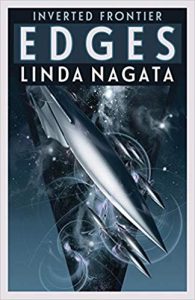Russell Letson Reviews Edges by Linda Nagata
 Edges, Linda Nagata (Mythic Island 978-1-937197-27-8, $18.00, 411pp, tp) April 2019. Cover by Sarah Anne Langton. [Order from MythicIslandPress.com, PO Box 1293, Kula HI 96790-1293; <mythicislandpress.com>.]
Edges, Linda Nagata (Mythic Island 978-1-937197-27-8, $18.00, 411pp, tp) April 2019. Cover by Sarah Anne Langton. [Order from MythicIslandPress.com, PO Box 1293, Kula HI 96790-1293; <mythicislandpress.com>.]
Linda Nagata’s first four novels – Bohr Maker (1995), Tech-Heaven (1995), Deception Well (1997), and Vast (1998) – constituted a long future history, eventually labelled the Nanotech Succession. Edges is the first volume of an extension of that series, a sequence bearing the overall title “Inverted Frontier” – a reference to the book’s initiating event, a journey from the fringes of human space back toward its old centers.
After millennia of extrasolar expansion, climaxing in the building of star-blotting Dyson swarms called “Hallowed Vasties,” most human civilization has been destroyed by the Chenzeme, unstoppable, planet-killing sentient warcraft left behind by an ancient interstellar conflict. Deception Well and Vast are set after the collapse of the Hallowed Vasties and other human colonies and the arrival of waves of refugees at Deception Well, a planet and solar system that seem to have been engineered by some long-vanished species to hold off Chenzeme attack. It has been many centuries since anyone has ventured away from Deception Well (the story recounted in Vast), and only one of those adventurers came back, but now another shows up, with a hijacked and subverted Chenzeme courser he has renamed Dragon and a proposition: to mount another expedition, this time to see what happened among the Vasties and whether anything out there survives.
The returnee, Urban, attracts a rather larger crew of volunteers than he had counted on – including his old lover and shipmate, Clementine, who has been waiting and watching for him for most of a thousand years. Setting up the expedition, adapting Dragon to accommodate a substantial physical crew, and various social-engineering projects occupy much of the first half of the book. But another story periodically interrupts this one with chapters titled “First,” “Second,” and so on, tracking the efforts of an unnamed being to survive an unspecified catastrophe and escape a kind of interstellar shipwreck or desert-island situation – to rebuild a once-larger self, regain a greater status, and take revenge on the one responsible for the near-destruction of what he was. When the two story threads finally intersect, the crew of Dragon finds itself enmeshed in another ancient conflict, not as old as the 30-million-years-ago Chenzeme wars, but nevertheless potentially as disruptive to their expedition.
The story operates on tensions among and between scales and powers: interpersonal/political, magical/technological, and spatio/temporal. Without faster-than-light travel, the journey is long even for near-immortals, and the story unfolds over centuries that pass as easily as months and years. This is not much of a problem for the crew from Deception Well, who have extensive control over their physical and mental conditions: they are able to go into cold sleep, or adjust their temporal senses, or exist as embodied or unbodied persons for as long as they need to. They are, in fact, thoroughly post-human, capable of completely redesigning or duplicating themselves as computational “ghosts” or physical avatars, even to the point of becoming the kind of “sculpted” intelligence that figured in Vast. Urban has taken a variation on this route in his centuries of control of Dragon by
replicating his ghost over and over again and then editing and pruning each electronic avatar to create a new, machinelike personality incapable of distraction or boredom. These artificial ghosts became his staff, his crew, each designed to embrace a specific task…. He named these assistant personalities the Apparatchiks, an ancient term he found amusing with its connotation of blind devotion to assigned duty.
Even though these post-humans can make and remake themselves into whatever kind of person they choose, and despite the grading of Well citizens into levels – the crew are all “fifth level… rational and cooperative” – there is nearly as much variety among them as there would be among a population of unimproved base-model humans. This includes remnants of all-too-human flaws such as ambition, obsession, deceptiveness, fearfulness, jealousy, and mistrust, and those traits exacerbate the problems presented by the mysterious shipwrecked being they eventually encounter. (There are also, to be fair, love, honor, courage, persistence, and selflessness.)
There is, of course, plenty going on in the large-scale science-fictional side of the book: huge vistas of space and time, deep and mysterious histories, gods and monsters (and one god-monster), giant starships, alien threats, and a decent dose of space-battle. And this is only Act One.
In the imaginary coffee-house of my mind, Nagata’s Succession novels are hanging out with thematic and subgeneric cousins by Neal Asher, Iain M. Banks, Greg Bear, Greg Benford, Greg Egan, Kathleen Ann Goonan, and Robert Reed, discussing the post-human condition, how many nanotechnologies can fit on the head of a pin, the nature and place of sentience in the universe, and whether there is a Long Game in which humankind can play and survive. There’s a portrait of Olaf Stapledon hanging over the mantelpiece, along with a long-barreled raygun. Both are icons of the tradition.
Russell Letson, Contributing Editor, is a not-quite-retired freelance writer living in St. Cloud, Minnesota. He has been loitering around the SF world since childhood and been writing about it since his long-ago grad school days. In between, he published a good bit of business-technology and music journalism. He is still working on a book about Hawaiian slack key guitar.
This review and more like it in the April 2019 issue of Locus.
 While you are here, please take a moment to support Locus with a one-time or recurring donation. We rely on reader donations to keep the magazine and site going, and would like to keep the site paywall free, but WE NEED YOUR FINANCIAL SUPPORT to continue quality coverage of the science fiction and fantasy field.
While you are here, please take a moment to support Locus with a one-time or recurring donation. We rely on reader donations to keep the magazine and site going, and would like to keep the site paywall free, but WE NEED YOUR FINANCIAL SUPPORT to continue quality coverage of the science fiction and fantasy field.







